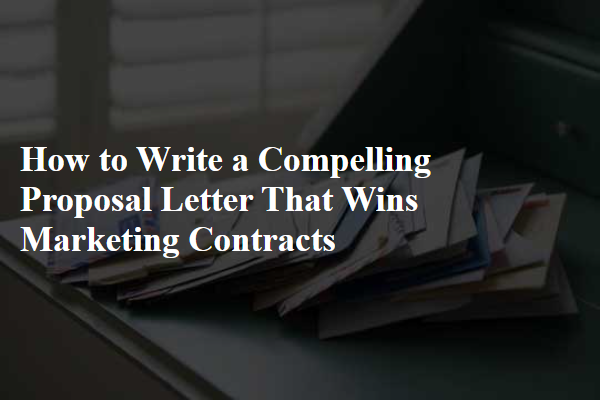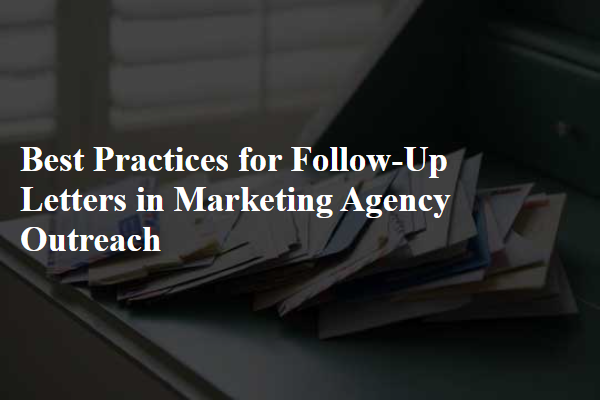
Craft a marketing proposal letter that clearly highlights your agency's unique value proposition and demonstrates a deep understanding of the client's needs and market challenges. Use persuasive language paired with concrete examples of past successes to build credibility and trust. Tailor the content to address the client's pain points while outlining specific, measurable strategies that showcase your ability to deliver results.
Understanding Your Client's Needs
| Step | Description | Key Tips |
|---|---|---|
| 1. Research the Client | Understand the client's business, goals, and challenges. Identify their target audience and current marketing strategies. | Use industry reports, company websites, and social media profiles for accurate information. |
| 2. Craft a Clear Introduction | Begin with a concise greeting that states the purpose of the letter and expresses enthusiasm for the project opportunity. | Mention your company's name and summarize your marketing expertise relevant to the client's needs. |
| 3. Present a Strong Value Proposition | Explain how your marketing services can solve the client's problems and drive measurable results. | Highlight unique selling points such as data-driven strategies, proven ROI, or creative campaigns. |
| 4. Outline the Proposed Services | Provide a detailed breakdown of the marketing services offered, including digital marketing, content creation, SEO, and social media management. | Customize the services to match the client's industry and specific business goals. |
| 5. Showcase Relevant Experience | Include examples of past marketing campaigns, client testimonials, and case studies demonstrating success. | Quantify results with statistics such as percentage increase in engagement or sales conversions. |
| 6. Specify the Timeline and Budget | Present a realistic project timeline and transparent pricing model to build trust. | Include milestones and payment terms to provide clarity. |
| 7. Include a Strong Call to Action | Encourage the client to schedule a meeting or contact you for further discussion. | Make it easy to respond by providing direct contact information. |
| 8. Proofread and Personalize | Review the letter for grammar, clarity, and tone. Tailor the content to the specific client. | Avoid generic language; use the client's name and industry-specific terms. |
Researching the Market and Competitors
Writing a compelling proposal letter is essential for securing marketing contracts and demonstrating your expertise. A well-crafted letter clearly outlines your value proposition and addresses the client's specific needs.
Focus on showcasing measurable results from past campaigns and include quantifiable data to build credibility. Personalizing the proposal to reflect the client's goals enhances engagement and increases the likelihood of winning the contract.
Crafting an Irresistible Value Proposition
Craft a compelling proposal letter by clearly defining the marketing goals and demonstrating a deep understanding of the client's industry and target audience. Use data-driven insights and specific strategies to showcase your expertise and explain how your solutions deliver measurable results. Highlight past successes with case studies and emphasize your unique value proposition to build trust and persuade decision-makers.
Structuring a Winning Proposal Letter
Crafting a compelling proposal letter is essential for securing marketing contracts and demonstrating your expertise to potential clients. A well-structured, clear, and persuasive proposal highlights your understanding of client needs and showcases tailored solutions.
- Understand Client Objectives - Research the client's business goals and challenges to tailor your proposal precisely.
- Highlight Unique Value - Emphasize the distinctive benefits your marketing strategies offer compared to competitors.
- Include Clear Call-to-Action - Guide the client on the next steps to create a sense of urgency and facilitate engagement.
Personalizing Your Opening Statement
Crafting a compelling proposal letter significantly increases your chances of winning marketing contracts by clearly conveying value and professionalism. A well-structured proposal highlights your understanding of the client's needs and offers tailored solutions.
- Research the Client - Gather detailed information about the client's business, target audience, and marketing challenges to personalize your proposal effectively.
- Highlight Unique Selling Points - Emphasize your expertise, past successes, and what differentiates your marketing services from competitors.
- Include Clear Call-to-Action - Provide specific next steps for the client, making it easy to engage with you and move forward in the contract process.
Highlighting Relevant Experience and Success Stories
Writing a compelling proposal letter is essential to secure marketing contracts. It must clearly communicate your value proposition and demonstrate an understanding of the client's needs.
Start with a strong introduction that highlights your expertise and relevant experience. Use persuasive language to outline the benefits your marketing services will deliver, backed by data and case studies.
Presenting Clear Marketing Solutions
Craft a compelling proposal letter by clearly outlining your marketing strategy, demonstrating how it addresses the client's specific goals and challenges. Highlight your unique value proposition with data-driven results and case studies to build credibility. Conclude with a persuasive call to action, encouraging the client to engage further and secure the contract.
Outlining Measurable Results and KPIs
What makes a proposal letter stand out in the competitive marketing industry? Crafting a compelling proposal letter requires clear communication of value and a deep understanding of the client's needs. Highlight unique marketing strategies and demonstrate measurable results to capture the client's attention effectively.
How important is customization in a proposal letter for marketing contracts? Tailoring each proposal to address specific client goals shows professionalism and dedication. This approach increases the chances of winning contracts by aligning your services with the client's vision.
What key elements should a persuasive marketing proposal letter include? Include a strong introduction, a clear statement of marketing objectives, and a detailed plan outlining tactics and deliverables. Emphasize past success stories and meaningful metrics to build credibility and trust.
How can tone and format affect the success of a marketing proposal letter? A professional, confident tone combined with a clean, organized format enhances readability and impression. Using bullet points and concise language helps convey your message clearly and keeps the reader engaged.
Why is it crucial to follow up after sending a proposal letter? Following up demonstrates enthusiasm and commitment to the client's project. Prompt and courteous communication can address questions and maintain momentum toward securing the marketing contract.
Reinforcing Trust with Testimonials and Credentials
Crafting a compelling proposal letter is essential to securing marketing contracts and standing out in a competitive industry. A well-written proposal clearly communicates your value, expertise, and understanding of the client's needs.
- Research the Client - Gather detailed information about the client's business, objectives, and challenges to tailor the proposal effectively.
- Highlight Your Unique Selling Points - Emphasize your skills, past successes, and marketing strategies that differentiate you from competitors.
- Include Clear Deliverables and Pricing - Specify the scope of work, timelines, and transparent costs to build trust and clarity.
Proofread and format the letter professionally to make a strong, positive impression on potential clients.
Ending with a Strong, Actionable Call to Action
Writing a compelling proposal letter is essential for winning marketing contracts. A well-crafted letter clearly communicates your value and expertise to potential clients.
Start by researching the client's needs and tailoring your proposal to address their specific marketing goals. Highlight your unique strategies, past successes, and measurable results. Use persuasive language to demonstrate how your services can solve their problems and drive growth.



Comments